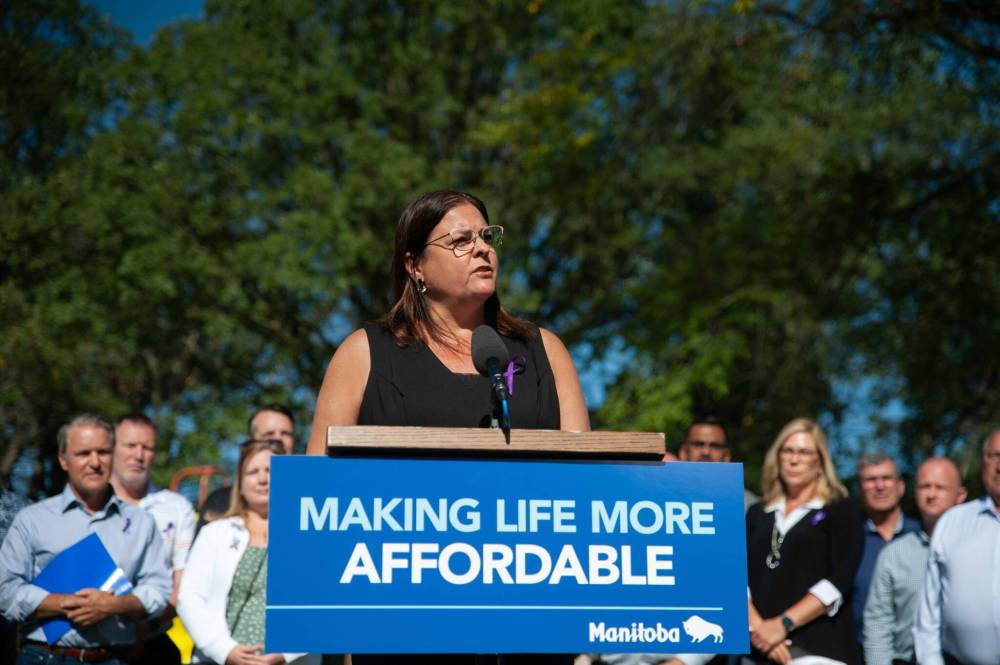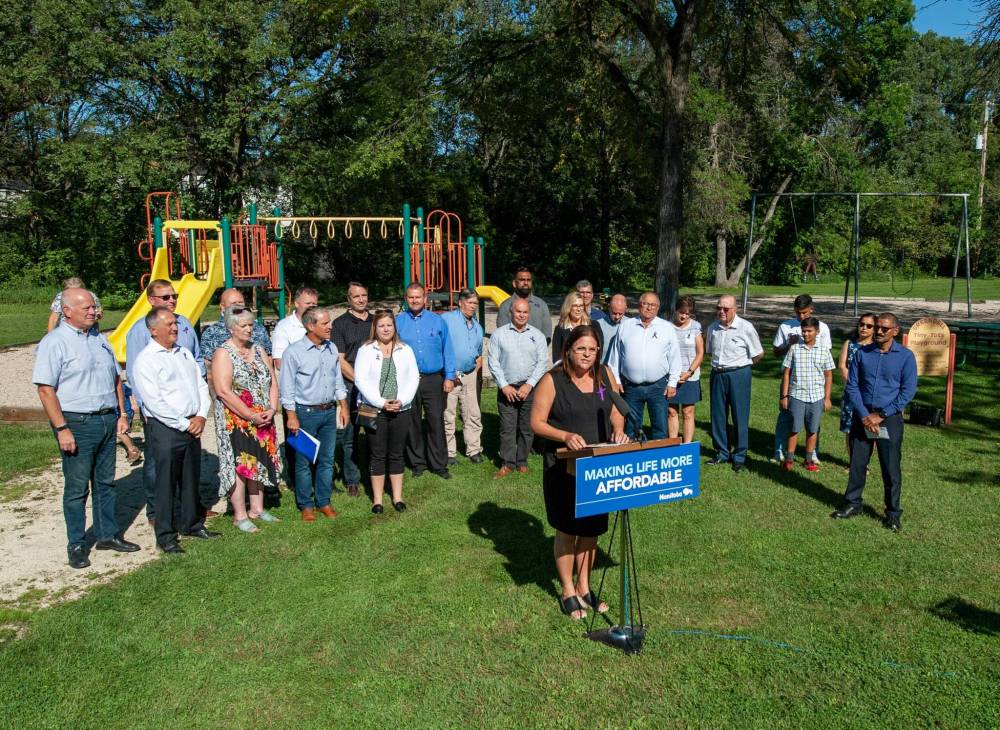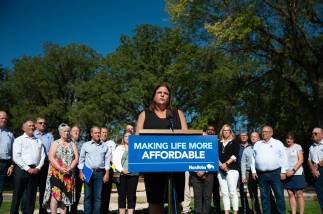Tories’ affordability initiative less about families, all about politics
Read this article for free:
or
Already have an account? Log in here »
To continue reading, please subscribe:
Monthly Digital Subscription
$0 for the first 4 weeks*
- Enjoy unlimited reading on winnipegfreepress.com
- Read the E-Edition, our digital replica newspaper
- Access News Break, our award-winning app
- Play interactive puzzles
*No charge for 4 weeks then price increases to the regular rate of $19.00 plus GST every four weeks. Offer available to new and qualified returning subscribers only. Cancel any time.
Monthly Digital Subscription
$4.75/week*
- Enjoy unlimited reading on winnipegfreepress.com
- Read the E-Edition, our digital replica newspaper
- Access News Break, our award-winning app
- Play interactive puzzles
*Billed as $19 plus GST every four weeks. Cancel any time.
To continue reading, please subscribe:
Add Free Press access to your Brandon Sun subscription for only an additional
$1 for the first 4 weeks*
*Your next subscription payment will increase by $1.00 and you will be charged $16.99 plus GST for four weeks. After four weeks, your payment will increase to $23.99 plus GST every four weeks.
Read unlimited articles for free today:
or
Already have an account? Log in here »
Hey there, time traveller!
This article was published 31/08/2022 (1193 days ago), so information in it may no longer be current.
It was touted as an affordability initiative, an effort by the Progressive Conservative government to help Manitobans “most in need” of relief from inflation.
In the end, however, Wednesday’s announcement by Premier Heather Stefanson was just further proof that her Tory government does not have the interest or the aptitude to help the neediest Manitobans.
Throughout the six years the Tories have been in power, high-profile “affordability” policies have manifested in cuts to sales and property taxes that provide a disproportionate benefit to people paying the most tax. Although tax relief is not bad in and of itself, the Tories have reminded us that tax cuts do not help families who cannot make ends meet.
In her latest affordability gambit, Stefanson unleashed a range of initiatives designed to help those “most in need” of inflation relief.
ETHAN CAIRNS / WINNIPEG FREE PRESS 
Inflation hits everyone, but the pain varies depending on where you are on the income spectrum. Stefanson’s announcement this week seems to confuse those struggling to pay for gas for their boats at the cottage, and those struggling to put food on the table to feed their kids.
You can pool the initiatives within Wednesday’s announcement into two main buckets: the ones aimed at easing the pain of people who are not really threatened by inflation; and the others that thankfully use a narrower target to help those most in need.
In the first bucket — support for financially secure people — is the per-child direct payment of $250 for the first child and $200 for every child after that, a program that will consume $63 million of the $87 million outlined in Stefanson’s announcement. The payments will be available to every Manitoba family with a household income of less than $175,000.
Let’s put that income threshold in some context. That is 3.5 times the average industrial wage in Manitoba ($48,700) and eight times $22,000, the annual earnings of someone making minimum wage. That is too high an income threshold to make this a legitimate program for those most in need.
Stefanson did better on her efforts to support seniors and those on Employment and Income Assistance (EIA). In the former, all seniors with household income of less than $40,000 will get a one-time $300 payment.
This effort to support seniors is, thankfully, more targeted than past efforts. You may remember in 2020 the PC government took flak for a $45 million program that provided all seniors, regardless of income or personal wealth, with a $200 payment to cover increased household costs due to the pandemic.
EIA recipients without children will get a permanent benefit increase of $50 per month, while those on disability assistance will get an additional $25 a month.
However, Manitobans with children who are collecting EIA will not get a rate bump because they are getting a one-time, per-child payment. The end result is preposterously unjust: someone on EIA will get the exact same per-child payment as someone making $175,000.
Stefanson claimed these new measures form the next phase in the “family affordability package” the Tories have been rolling out since the 2020 provincial election campaign. However, as noted earlier, most of the pillars of the affordability package have been dedicated to helping Manitobans for whom affordability is a less pressing issue.
And to make matters worse, the tax cuts the Tories have rolled out under the initiative are extremely expensive. To date, Tory tax cuts — which almost exclusively benefit higher-income Manitobans — drain $1.2 billion annually from the provincial treasury.
ETHAN CAIRNS / WINNIPEG FREE PRESS 
None of that forms an argument for Stefanson to do nothing about the impacts of inflation.
However, the major concern is that anytime the government pumps more money into the economy, it will sustain consumer spending, which is a major contributor to skyrocketing inflation. Even with that threat, governments around the world are launching programs to cushion citizens against the ravages of inflation.
The Joe Biden administration in the United States has enacted a number of initiatives, from releasing more oil from government reserves to lower the price of gasoline to providing subsidies to smaller, independent meat and poultry producers to increase supply of basic foodstuffs.
Governments in Brazil, South Korea, South Africa, Australia and India have cut fuel taxes, the United Kingdom is rebating council taxes to homeowners to cover heating costs, and Germany has imposed a low rate of 9 Euros per month ($12 Cdn) for all regional rail and bus networks.
However, if there is anything that these programs prove, it’s that governments have few effective tools to fight inflation. And that means most of what they are doing is about politics and less about economics.
That is certainly the case in Manitoba, where PC politics prevent Tories from identifying “those most in need.”
dan.lett@freepress.mb.ca

Born and raised in and around Toronto, Dan Lett came to Winnipeg in 1986, less than a year out of journalism school with a lifelong dream to be a newspaper reporter.
Our newsroom depends on a growing audience of readers to power our journalism. If you are not a paid reader, please consider becoming a subscriber.
Our newsroom depends on its audience of readers to power our journalism. Thank you for your support.








